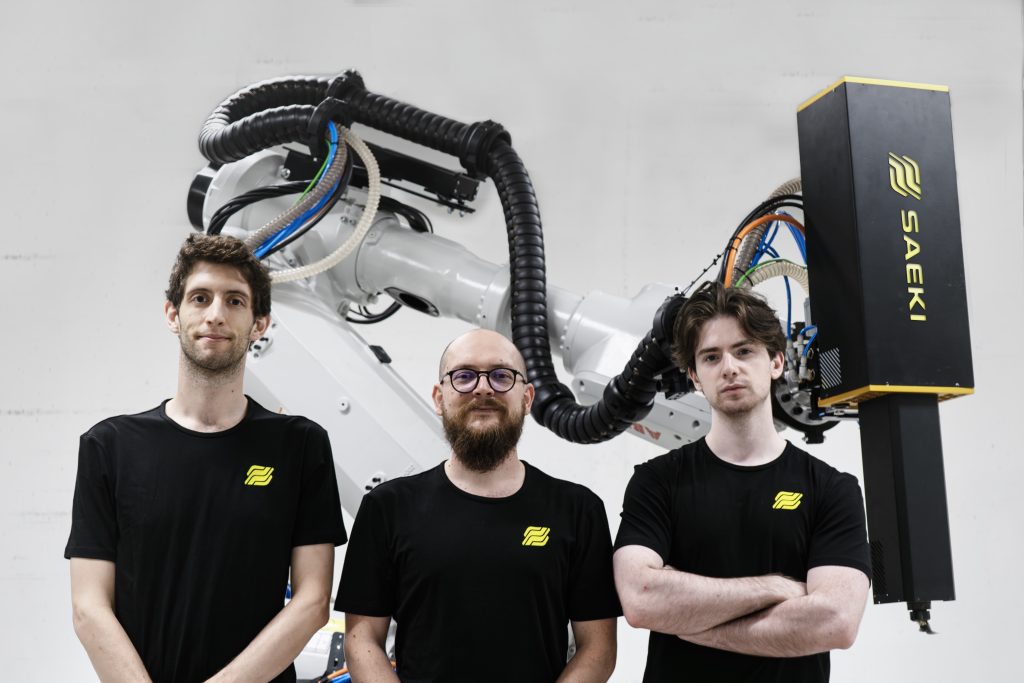Nominations are now open for the 3D Printing Industry Awards 2023. Who are the leaders in 3D printing? Find out on November 30th when the winners across twenty categories will be announced during our London-based live awards ceremony.
Switzerland-based robotics 3D printing startup SAEKI has raised $2.3 million in seed funding to create fully automated “robots-as-a-service” manufacturing microfactories offering on-demand 3D printing.
These production hubs will leverage digital manufacturing and industrial robotics to 3D print a wide range of large-scale components for the construction, automotive, aerospace, marine and energy verticals.
The funding round was led by Wingman Ventures, with Vento Ventures, Getty Capital and angel investors also participating.
“For vast swathes of industry it’s not practical to own and manage robots that can create what you need quickly. We are at the forefront of addressing this and democratizing access to the best tools and creating productive, sustainable and effective outcomes for industry,” commented SAEKI Co-Founder Andrea Perissinotto.
Edouard Treccani, Principal at Wingman Ventures, added that “We’re thrilled to join forces with SAEKI as lead investor of their pre-seed round. Their groundbreaking approach to distributed additive manufacturing has the power to revolutionize sectors from aerospace to construction through disruptive tech, local production and sustainable materials.”

SAEKI’s production hubs
SAEKI was founded in 2021 by Andrea Perissinotto, Oliver Harley and Matthias Leschok, and has previously developed a novel method for the cost-effective production of custom concrete formworks. This system combines 3D printings and milling with industrial robots that can 3D print the formworks up to multiple meters in length.
The company’s latest project looks to resolve a significant bottleneck within the manufacturing industry. According to SAEKI, the development and production of complex parts, such as lightweight carbon fiber elements and topology optimized concrete floor slabs, is a time consuming and costly process.
With 24-hour product turnaround times, it is claimed that SAEKI’s production hub will enable buyers to rapidly innovate and grow their service offerings. Moreover, the company claims that the production hubs will allow for the rapid, on-demand production of large-scale parts, something which “has not been previously possible.” SAEKI will also provide an instant quoting service as part of its new offering. Tailored to the business needs of the customer, this platform will seek to remove the “complex opaque approach currently in the market.”
The production hubs will incorporate industrial robots built by SAEKI. These robots will combine a range of digital manufacturing methods from 3D printing, milling, and inspection to create an all-in-one low-waste fabrication process. Moreover, the robots will be used as self-contained microfactories (called ‘uFactories’), making them easy to deploy for localized additive manufacturing.
SAEKI is currently building its first production hub, which is set to launch in early 2024 with selected partners. This will serve as a blueprint for further expansion, with the company eyeing the eventual creation of a decentralized network of robot-operated production hubs around the world.
“In 10 years from now SAEKI envisions lights-out factories filled with SAEKI microfactories autonomously producing complex, material and weight-saving formwork for the construction industry, fixtures and tooling for super-sonic jets or composite molds for the next generation formula one cars,” explained Matthias Leschok, Co-Founder at SAEKI.
The SAEKI microfactory. Video via SAEKI.
On-demand additive manufacturing
Following recent supply chain challenges, a number of companies have sought to reshore on-demand 3D printing capabilities. Earlier this year, Texas-based industrial 3D printer manufacturer Essentium, Inc. launched Essentium Parts On-Demand (EPOD). This in-house production service is based on the company’s High Speed Extrusion (HSETM) 3D printing technology. Operating nine HSE 3D printers on launch, Essentium plans to expand this to 15+ by the end of 2024.
Early adopters are already said to be benefiting from EPOD. One customer in the oil and gas industry has employed HSE’s 3D printing capability and capacity to 3D print PEEK parts. Another in the Aviation Technical Operations industry leveraged the polymer-to-part solution to produce 100+ housings out of a bespoke material with flame-resistant qualities.
Elsewhere, it was announced last year that San Francisco-based on-demand manufacturing service provider Fictiv had secured $100 million in Series E funding. This capital has been employed to alleviate supply chain risks by improving the speed and robustness of the company’s on-demand 3D printing services.
Subscribe to the 3D Printing Industry newsletter to keep up to date with the latest 3D printing news. You can also follow us on Twitter, like our Facebook page, and subscribe to the 3D Printing Industry Youtube channel to access more exclusive content.
Are you interested in working in the additive manufacturing industry? Visit 3D Printing Jobs to view a selection of available roles and kickstart your career.
Featured image shows the SAEKI founders (left to right) Oliver Harley, Matthias Leschok, and Andrea Perissinotto. Photo via SAEKI.


